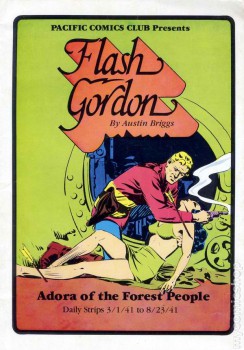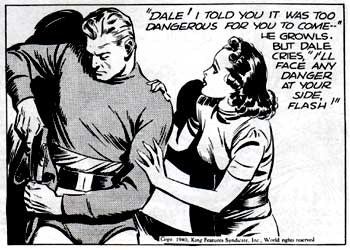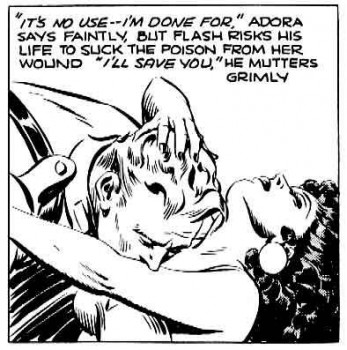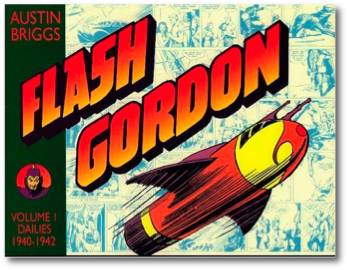Blogging Austin Briggs’ Flash Gordon, Part Nine “The Isle of the Elvins”

 “The Isle of the Elvins” was the ninth installment of Austin Briggs’ daily Flash Gordon comic strip serial for King Features Syndicate. Originally published between April 22, 1943 and March 25, 1944, “The Isle of the Elvins” follows on directly from “The Royal Hunt” with Queen Tigra of Forestia accidentally losing her way back to the capitol and leading Flash and Dale into Lost Lake, where a fabled treasure stolen from Forestia long ago is believed to be buried. The trio finds a rowboat and set out to cross the lake when the boat’s owner overtakes them and capsizes the boat. Flash is overcome by the stranger and nearly drowned and has to be rescued by Dale and Tigra. The stranger takes possession of Flash’s ray gun and takes them captive. He introduces himself as Doron, King of the Elvins who live on an island in Lost Lake. Soon they are joined by the diminutive form of the Elvin General Krom.
“The Isle of the Elvins” was the ninth installment of Austin Briggs’ daily Flash Gordon comic strip serial for King Features Syndicate. Originally published between April 22, 1943 and March 25, 1944, “The Isle of the Elvins” follows on directly from “The Royal Hunt” with Queen Tigra of Forestia accidentally losing her way back to the capitol and leading Flash and Dale into Lost Lake, where a fabled treasure stolen from Forestia long ago is believed to be buried. The trio finds a rowboat and set out to cross the lake when the boat’s owner overtakes them and capsizes the boat. Flash is overcome by the stranger and nearly drowned and has to be rescued by Dale and Tigra. The stranger takes possession of Flash’s ray gun and takes them captive. He introduces himself as Doron, King of the Elvins who live on an island in Lost Lake. Soon they are joined by the diminutive form of the Elvin General Krom.
At long last with the introduction of the Elvins, Austin Briggs steps out of Alex Raymond’s shadow and produces a storyline with characters worthy of the strip, without seeming like pale imitations of what has gone before. Arriving on the island as slaves, they are surrounded by the Elvins, who hop up and down excitedly repeatedly shouting, “More girls!” Clearly, Briggs was enjoying himself with this strip. General Krom takes a shine to Tigra, calling her “curly-top” (one can’t help but think of Shirley Temple’s movie of the previous decade), while the indignant Queen of Forestia dismisses her captor as “monkey-face.” Flash comes to Tigra’s defense, but is quickly overwhelmed by the sheer number of Elvins in a scene that recalls the Lilliputians of Gulliver’s Travels.
While Flash is imprisoned in the treasure storehouse, the girls are turned over to Garda, the homely matron of the slave hall who curtails General Krom’s amorous pursuit by pushing her open palm into his face like a character from a Warner Bros. gangster picture of the 1930s. There is a nice bit of Alex Raymond-style cheesecake art as Dale and Tigra strip off their blouses to change into their skimpy slave outfits. Garda’s spark-gun, which gives off an electric shock, seems to pre-figure the modern Taser. Among the kitchen staff, Tigra discovers a couple of girls she had exiled from her kingdom, including the embittered Felis, who promises a cat-fight with the similarly feline-named Tigra.

 The storyline develops further as King Doron and Queen Tigra discover an attraction to one another which promises to resolve the subplot of Tigra’s infatuation with Flash, particularly since Doron has been portrayed as nearly as noble and heroic a character as Flash since his introduction. The King comes to the enslaved Queen of Forestia’s aid after she dumps a kettle of steaming soup on the head of the lecherous Krom. Complications soon arise with the introduction of Doron’s mother, the saintly Dolora. The rivalry between Krom and Doron intensifies, with the Elvin’s resentment of the human Doron and his mother all too obvious.
The storyline develops further as King Doron and Queen Tigra discover an attraction to one another which promises to resolve the subplot of Tigra’s infatuation with Flash, particularly since Doron has been portrayed as nearly as noble and heroic a character as Flash since his introduction. The King comes to the enslaved Queen of Forestia’s aid after she dumps a kettle of steaming soup on the head of the lecherous Krom. Complications soon arise with the introduction of Doron’s mother, the saintly Dolora. The rivalry between Krom and Doron intensifies, with the Elvin’s resentment of the human Doron and his mother all too obvious.
Flash escapes from the treasure room and overpowers an Elvin, taking a spark-gun. He locates Dale and Tigra and gets into a gunfight with Garda before paralysing her with the spark-ray. While Flash works to free all of the slave girls, Felis slips away to warn General Krom. The Elvins surround the building. The other girls fear the wrath of their slavers too much to risk escaping. Dale and Tigra are the only ones willing to follow Flash in a daring run.
They make it back to Lost Lake, where they overpower a sentry and steal his motorboat. While Flash starts the boat, Dale brings supplies from the sentry hut and realizes that Tigra is missing. Dale discovers a note from the Queen, imploring them to leave without her. Dale believes her motive is lust for her kingdom’s lost treasure, unaware that Tigra has fallen in love with Doron.
Krom releases a pack of rat-wolves to hunt down the fugitives. Flash and Dale only escape the vicious creatures with the aid of a gas-gun Flash has found in the sentry hut. Eventually, the duo meets up with Doron and Tigra. After a fist fight between the men and a cat fight between the girls, they realize they are on the same side and set out to return to the Elvin city to liberate Doron’s mother, Dolora. Upon doing so, Briggs reveals the secret that Dolora and Doron have been hiding. Doron’s father, King Eldor, has been missing for years and is believed to be kept as a slave laboring in the Elvin gold mines.
The group manages to infiltrate the gold mines, but their search for King Eldor only turns up the hostile subterranean mole men, an attacking dragon, and giant ferrets. They stumble across Eldor’s long-abandoned home and have given him up for dead when they are surrounded by Elvins and have to deal with another mole men attack. The skirmish ends in General Krom’s death. Tigra is bitten by a giant ferret and begins to suffer paranoid delusions which no one seems to connect to her infection.
The group meets a geriatric wild man in the forest who, of course, turns out to be King Eldor driven mad from a ferret bite. Learning of a natural remedy, they restore the King to his senses only to have a jealous Tigra nearly kill Eldor, believing he is stealing his son from her. Finally, Doron suggests treating Tigra with the remedy and she begins to recover her senses. Eldor is reunited with Dolora after decades of separation and the reader learns that the late General Krom imprisoned the King so that he could rule with Doron as his puppet monarch. Now that Krom is dead, the Elvins embrace the true royal family. Tigra happily stays on to become Doron’s wife as Flash and Dale depart the Isle of the Elvins in a nice wrap-up to Austin Briggs’ finest storyline for the daily strip. The mischievious Elvins, whose sexual appetite is matched only by their fiery tempers and love of scrapping will have a strong influence on Dan Barry’s long run on the strip beginning in the 1950s.
William Patrick Maynard was authorized to continue Sax Rohmer’s Fu Manchu thrillers beginning with The Terror of Fu Manchu (2009; Black Coat Press). A sequel, The Destiny of Fu Manchu was published earlier this year by Black Coat Press. Next up is a collection of short stories featuring an Edwardian detective, The Occult Case Book of Shankar Hardwicke and a hardboiled detective novel, Lawhead. To see additional articles by William, visit his blog at SetiSays.blogspot.com